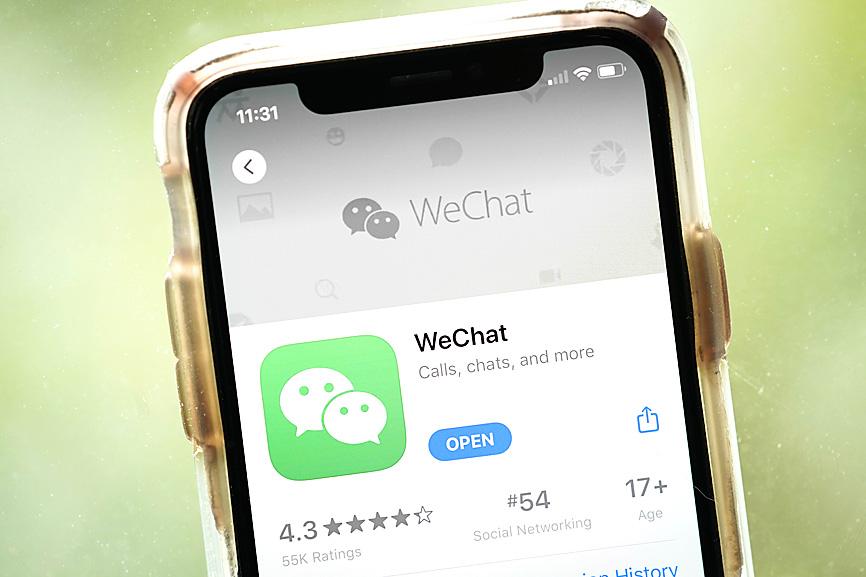Some US-based users of WeChat are suing US President Donald Trump in a bid to block an executive order that they say would effectively bar access in the US to the hugely popular Chinese messaging app.
The complaint, filed on Friday in San Francisco, is being brought by the nonprofit US WeChat Users Alliance and several people who say they rely on the app for work, worship and staying in touch with relatives in China.
The plaintiffs said that they are not affiliated with WeChat, nor its parent company, Tencent Holdings.

Photo: AFP
In the lawsuit, they asked a federal court judge to stop Trump’s executive order from being enforced, claiming it would violate its US users’ freedom of speech, free exercise of religion and other constitutional rights.
“We think there’s a First Amendment interest in providing continued access to that app and its functionality to the Chinese-American community,” Michael Bien, one of the plaintiffs’ attorneys, said on Saturday.
Trump on Aug. 6 ordered sweeping but vague bans on transactions with the Chinese owners of WeChat and another popular consumer app, TikTok, saying they are a threat to US national security, foreign policy and the economy.
The twin executive orders — one for each app — are expected to take effect on Sept. 20, or 45 days from when they were issued.
The orders call on US Commerce Secretary Wilbur Ross, who is also named as a defendant in the US WeChat Users Alliance lawsuit, to define the banned dealings by that time.
It remains unclear what the orders would mean for the apps’ millions of users in the US, but experts have said that the orders appear intended to bar WeChat and TikTok from the app stores run by Apple and Google.
That would make them more difficult to use in the US.
“The first thing we’re going to seek is a postponement of the implementation of the penalties and sanctions — a reasonable period of time between explaining what the rules are and punishing people for not complying with them,” Bien said.
Mobile research firm Sensor Tower estimates about 19 million US downloads of WeChat, but it is crucial infrastructure for Chinese students and residents in the US to connect with friends and family in China and for anyone who does business with China.
Within China, WeChat is censored and expected to adhere to content restrictions set by authorities.
The Citizen Lab Internet watchdog group in Toronto have said that WeChat monitors files and images shared abroad to aid its censorship in China.
Even so, the US WeChat Users Alliance complaint argued that losing access to the app would harm millions of people in the US who rely on it, adding that it is the only app with an interface designed for Chinese speakers.
“Since the executive order, numerous users, including plaintiffs, have scrambled to seek alternatives without success. They are now afraid that by merely communicating with their families, they may violate the law and face sanctions,” the complaint says.

The death of a former head of China’s one-child policy has been met not by tributes, but by castigation of the abandoned policy on social media this week. State media praised Peng Peiyun (彭珮雲), former head of China’s National Family Planning Commission from 1988 to 1998, as “an outstanding leader” in her work related to women and children. The reaction on Chinese social media to Peng’s death in Beijing on Sunday, just shy of her 96th birthday, was less positive. “Those children who were lost, naked, are waiting for you over there” in the afterlife, one person posted on China’s Sina Weibo platform. China’s

‘NO COUNTRY BUMPKIN’: The judge rejected arguments that former prime minister Najib Razak was an unwitting victim, saying Najib took steps to protect his position Imprisoned former Malaysian prime minister Najib Razak was yesterday convicted, following a corruption trial tied to multibillion-dollar looting of the 1Malaysia Development Berhad (1MDB) state investment fund. The nation’s high court found Najib, 72, guilty on four counts of abuse of power and 21 charges of money laundering related to more than US$700 million channeled into his personal bank accounts from the 1MDB fund. Najib denied any wrongdoing, and maintained the funds were a political donation from Saudi Arabia and that he had been misled by rogue financiers led by businessman Low Taek Jho. Low, thought to be the scandal’s mastermind, remains

‘POLITICAL LOYALTY’: The move breaks with decades of precedent among US administrations, which have tended to leave career ambassadors in their posts US President Donald Trump’s administration has ordered dozens of US ambassadors to step down, people familiar with the matter said, a precedent-breaking recall that would leave embassies abroad without US Senate-confirmed leadership. The envoys, career diplomats who were almost all named to their jobs under former US president Joe Biden, were told over the phone in the past few days they needed to depart in the next few weeks, the people said. They would not be fired, but finding new roles would be a challenge given that many are far along in their careers and opportunities for senior diplomats can

Australian Prime Minister Anthony Albanese yesterday announced plans for a national bravery award to recognize civilians and first responders who confronted “the worst of evil” during an anti-Semitic terror attack that left 15 dead and has cast a heavy shadow over the nation’s holiday season. Albanese said he plans to establish a special honors system for those who placed themselves in harm’s way to help during the attack on a beachside Hanukkah celebration, like Ahmed al-Ahmed, a Syrian-Australian Muslim who disarmed one of the assailants before being wounded himself. Sajid Akram, who was killed by police during the Dec. 14 attack, and